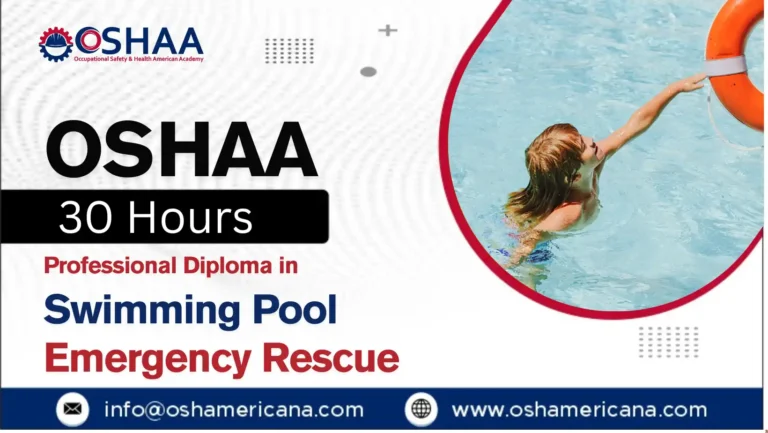Enhance caregiving safety and compliance with the OSHAA 30-Hours Health and Safety for Caregiving course. Gain essential skills to protect caregivers and patients.
Caregiving is one of the most meaningful yet demanding professions, requiring dedication, compassion, and a strong commitment to safety. Whether in private homes, care facilities, hospitals, or healthcare centers, caregivers face daily challenges that demand both skill and vigilance. The OSHAA 30-Hours Health and Safety for Caregiving course has been carefully designed to address these challenges by equipping professionals with the knowledge and practical tools needed to create safe, compliant, and supportive environments for both caregivers and those receiving care.
The OSHAA 30-Hours Health and Safety for Caregiving course is an accredited training program that emphasizes the importance of health and safety compliance in caregiving roles. Participants will gain a thorough understanding of essential safety principles, including hygiene practices, infection control, risk management, and emergency preparedness. By focusing on real-world caregiving scenarios, the course ensures that learners can apply their training directly to their daily responsibilities, reducing risks and enhancing the quality of care provided.
For caregivers, healthcare assistants, and facility managers, this course offers a vital opportunity to strengthen professional competence and ensure adherence to safety regulations. Without proper training, caregiving environments can become vulnerable to accidents, injuries, infections, and even legal liabilities. The OSHAA 30-Hours Health and Safety for Caregiving course addresses these risks by providing comprehensive instruction on how to prevent hazards, maintain safe working conditions, and protect both staff and patients from avoidable harm.
The program also highlights the importance of personal well-being for caregivers, recognizing that safe caregiving extends beyond patient care to include the health and resilience of the caregiver themselves. By completing the OSHAA 30-Hours Health and Safety for Caregiving course, participants will not only enhance their professional development but also contribute to safer, more effective caregiving environments. This training empowers caregivers to deliver high-quality care while ensuring compliance with health and safety standards, ultimately fostering trust, reliability, and excellence in caregiving practice.
The OSHAA 30-Hours Health and Safety for Caregiving course is more than just a certification; it is a professional investment in safety, compliance, and quality care. With its focus on practical application, regulatory awareness, and risk prevention, this program is essential for anyone committed to advancing their caregiving career while safeguarding the well-being of those they serve.
OSHAA 30-Hours Health and Safety for Caregiving
To enroll in the OSHAA 30-Hours Health and Safety for Caregiving course, learners are expected to meet the following criteria:
- Age Requirement
- Applicants must be at least 18 years of age to register for the OSHAA 30-Hours Health and Safety for Caregiving course. This minimum age requirement ensures that participants have the maturity and responsibility necessary to understand and apply the health and safety principles taught throughout the program.
- Educational Background
- A high school diploma or equivalent is recommended for enrollment in the OSHAA 30-Hours Health and Safety for Caregiving course. While this is the minimum educational requirement, individuals with higher education in healthcare, nursing, or related caregiving fields will find the course particularly advantageous, as it builds on existing knowledge and enhances professional competence in health and safety compliance.
- Work Experience
- Prior caregiving experience is not mandatory to join the OSHAA 30-Hours Health and Safety for Caregiving course. However, individuals currently working as caregivers, healthcare assistants, or facility managers will benefit greatly from the practical applications of the training. For those new to the caregiving profession, the course provides a strong foundation in safety protocols, risk management, and compliance standards, making it an excellent entry point into the field.
- English Proficiency
- Learners must be able to read, write, and speak English fluently to successfully complete the OSHAA 30-Hours Health and Safety for Caregiving course. Proficiency in English is essential for understanding course materials, following regulatory guidelines, and applying safety procedures in real-world caregiving environments. This requirement ensures that participants can fully engage with the training content and meet compliance expectations in professional caregiving settings.
The eligibility requirements for the OSHAA 30-Hours Health and Safety for Caregiving course are designed to ensure that learners are prepared to engage with the program effectively and apply its principles in their caregiving roles. By meeting these criteria, participants can maximize the benefits of this accredited training, strengthen their professional development, and contribute to safer, more compliant caregiving environments. This makes the OSHAA 30-Hours Health and Safety for Caregiving course an essential step for anyone committed to advancing their career in caregiving while prioritizing safety, compliance, and quality care.
Study Units
Learning Outcomes
Introduction to Health and Safety in Caregiving (2 Hours)
- Understand the fundamental principles of health and safety in caregiving environments.
- Recognise the caregiver’s role and responsibility in maintaining a safe environment.
- Identify potential hazards commonly encountered in caregiving settings.
- Develop an understanding of the duty of care and how to ensure both caregiver and patient safety.
Risk Assessment and Safety Protocols (4 Hours)
- Learn how to identify, assess, and prioritise risks in caregiving environments.
- Develop the ability to implement appropriate safety protocols to mitigate identified risks.
- Understand the process of reporting and addressing hazards.
- Apply risk management strategies to prevent accidents and injuries in caregiving settings.
Infection Control and Hygiene Practices (4 Hours)
- Understand the principles of infection control and the importance of hygiene in caregiving.
- Learn proper hand hygiene techniques and the use of sanitising products.
- Recognise the role of personal protective equipment (PPE) in infection prevention.
- Implement infection control measures to protect both caregivers and patients from infectious diseases.
Manual Handling and Safe Lifting Techniques (4 Hours)
- Learn correct lifting techniques to minimise the risk of injury for both caregiver and patient.
- Understand the importance of ergonomics in manual handling tasks.
- Use manual handling aids, such as hoists and transfer belts, to safely move patients.
- Reduce the risk of musculoskeletal injuries by applying safe lifting methods and principles.
Emergency Procedures and First Aid (4 Hours)
- Develop the skills to respond confidently to medical emergencies in caregiving situations.
- Learn basic first aid techniques, including CPR and wound care.
- Understand how to recognise signs of emergency conditions such as heart attacks, strokes, and seizures.
- Be equipped to handle emergency situations calmly and effectively, ensuring patient safety.
Personal Protective Equipment (PPE) and Safety Gear (3 Hours)
- Understand the types of personal protective equipment (PPE) used in caregiving.
- Learn how to properly use, wear, and dispose of PPE to prevent cross-contamination.
- Recognise when and how to use PPE in various caregiving tasks to minimise the risk of infection.
- Ensure compliance with PPE standards in caregiving environments to protect both caregivers and patients.
Health and Safety Regulations and Compliance (5 Hours)
- Understand the key health and safety regulations governing caregiving environments.
- Learn the legal responsibilities and ethical considerations related to health and safety.
- Become familiar with regulatory bodies and guidelines relevant to caregiving.
- Apply safety standards and compliance procedures to ensure caregiving practices are aligned with legal and regulatory requirements.
Stress Management and Self-Care for Caregivers (4 Hours)
- Recognise the signs and causes of stress and burnout in caregiving roles.
- Learn strategies to manage and reduce stress effectively in caregiving settings.
- Understand the importance of self-care in maintaining physical and mental well-being.
- Develop skills to build resilience and cope with the emotional demands of caregiving.
The OSHAA 30-Hours Health and Safety for Caregiving course delivers a wide range of benefits designed to strengthen the skills, knowledge, and professional standing of caregivers, healthcare assistants, and facility managers. This program is not only relevant to individual professionals but also to organizations and stakeholders who prioritize compliance, safety, and quality care. By aligning with global health and safety standards, the course ensures that participants are well-prepared to meet regulatory requirements, reduce workplace risks, and enhance overall caregiving performance. Completing this training provides a strong foundation for professional development, career advancement, and organizational efficiency, making it an essential investment for anyone involved in caregiving.
- Enhanced Knowledge and Skills
- Participants gain in-depth knowledge of health and safety principles tailored to caregiving environments. The OSHAA 30-Hours Health and Safety for Caregiving course equips learners with practical skills that can be applied immediately in daily caregiving tasks, ensuring safer and more effective care delivery.
- Regulatory Compliance
- The course emphasizes compliance with health and safety regulations, helping caregivers and organizations avoid legal penalties and maintain professional standards. By completing the OSHAA 30-Hours Health and Safety for Caregiving course, learners demonstrate their commitment to meeting industry requirements.
- Workplace Safety and Risk Reduction
- Caregiving involves physical interaction and potential hazards. This training provides strategies to minimize accidents, injuries, and infections, creating a safer environment for both caregivers and patients.
- Professional Development
- The OSHAA 30-Hours Health and Safety for Caregiving course supports career growth by enhancing professional credibility. Employers value certified caregivers who demonstrate advanced safety knowledge, making this course a valuable addition to any professional portfolio.
- Career Advancement Opportunities
- Certification in this program can open doors to higher-level caregiving roles, supervisory positions, and leadership opportunities within healthcare facilities. It positions learners as safety-conscious professionals ready for greater responsibility.
- Cost Savings and Efficiency
- By reducing workplace accidents and minimizing risks, organizations save on medical costs, compensation claims, and operational disruptions. The OSHAA 30-Hours Health and Safety for Caregiving course contributes to long-term financial efficiency.
- Improved Leadership and Communication
- The course fosters essential leadership and communication skills, enabling caregivers to effectively coordinate with colleagues, patients, and families. Strong communication ensures safety protocols are understood and followed consistently.
- Worker Well-Being and Productivity
- A safe work environment enhances caregiver morale and reduces stress. By applying the principles learned in the OSHAA 30-Hours Health and Safety for Caregiving course, participants can maintain their own well-being while improving productivity.
- Emergency Preparedness
- Learners are trained to respond effectively to emergencies such as medical incidents, fire hazards, or infectious outbreaks. This preparedness ensures quick, confident action that can save lives and protect facilities.
- Risk Management Strategies
- The course provides tools for identifying, assessing, and mitigating risks in caregiving environments. These strategies help prevent incidents before they occur, ensuring proactive safety management.
- Continuous Improvement
- The OSHAA 30-Hours Health and Safety for Caregiving course encourages a culture of ongoing learning and improvement. Participants are motivated to regularly update their knowledge and adapt to evolving safety standards.
- Global Relevance
- With caregiving being a universal profession, the principles taught in this course are applicable worldwide. Learners gain skills that are recognized across healthcare systems, enhancing international career mobility.
- Legal Protection
- Proper training reduces the likelihood of negligence claims and legal disputes. By completing the OSHAA 30-Hours Health and Safety for Caregiving course, caregivers and organizations strengthen their legal protection.
- Enhanced Patient Trust
- Patients and families feel more secure knowing that caregivers are trained in health and safety. This trust improves caregiver-patient relationships and enhances the reputation of caregiving organizations.
- Organizational Excellence
- For healthcare facilities, having staff trained in the OSHAA 30-Hours Health and Safety for Caregiving course demonstrates a commitment to excellence, compliance, and patient-centered care, setting them apart in a competitive industry.
The OSHAA 30-Hours Health and Safety for Caregiving course is more than a training program—it is a pathway to safer caregiving practices, stronger professional development, and improved organizational performance. By investing in this course, both individuals and institutions ensure compliance, reduce risks, and elevate the standard of care provided to those who need it most.
The OSHAA 30-Hours Health and Safety for Caregiving course is designed for professionals, organizations, and stakeholders committed to maintaining the highest standards of workplace safety, regulatory compliance, and caregiving excellence. This program is globally relevant, addressing the critical need for OSHA-aligned training in caregiving environments across healthcare facilities, residential care homes, and community-based services. By focusing on compliance, risk management, and professional development, the course ensures that participants are well-prepared to meet international workplace safety standards while advancing their careers and contributing to safer caregiving practices.
- Caregivers and Healthcare Assistants
- Provide direct care to patients in homes, hospitals, and long-term care facilities.
- The OSHAA 30-Hours Health and Safety for Caregiving course equips them with essential safety protocols to protect themselves and those in their care.
- Learners gain practical skills in infection control, hygiene, and emergency response.
- Training ensures compliance with OSHA standards, reducing risks of workplace incidents.
- Nursing Professionals
- Nurses play a central role in patient care and safety management.
- This course enhances their ability to implement health and safety procedures in clinical settings.
- Participants strengthen their knowledge of risk prevention and patient protection.
- Certification supports OSHA compliance and reinforces professional credibility.
- Facility Managers and Administrators
- Oversee the operations of healthcare and caregiving facilities.
- The OSHAA 30-Hours Health and Safety for Caregiving course helps them establish effective safety policies.
- They gain insights into regulatory compliance, workplace inspections, and hazard prevention.
- Training improves operational efficiency and reduces liability risks.
- Health and Safety Officers
- Responsible for monitoring workplace safety and ensuring compliance with regulations.
- This course provides advanced knowledge of OSHA standards specific to caregiving environments.
- Officers learn to identify hazards, conduct safety audits, and implement corrective measures.
- Certification strengthens their role in maintaining safe and compliant workplaces.
- Emergency Response Teams
- Handle medical emergencies, fire safety, and crisis management in caregiving facilities.
- The OSHAA 30-Hours Health and Safety for Caregiving course enhances their preparedness.
- Participants gain confidence in handling high-risk situations effectively.
- Training ensures alignment with OSHA emergency response requirements.
- Supervisors and Team Leaders
- Manage caregiving staff and oversee daily operations.
- This course equips them with leadership skills to enforce safety protocols.
- Supervisors learn effective communication strategies for safety compliance.
- Certification supports their role in fostering a culture of workplace safety.
- Human Resource Professionals
- Oversee staff training, compliance, and workplace well-being.
- The OSHAA 30-Hours Health and Safety for Caregiving course provides them with tools to integrate safety training into workforce development.
- HR professionals gain insights into reducing workplace injuries and absenteeism.
- Training ensures compliance with OSHA standards in employee management.
- Community Care Providers
- Deliver caregiving services in non-clinical, community-based settings.
- This course helps them adapt safety practices to diverse caregiving environments.
- Participants gain knowledge of hygiene, infection control, and patient safety.
- Certification ensures compliance with OSHA guidelines across varied care settings.
- International Caregiving Professionals
- Work in global healthcare systems where OSHA standards are recognized.
- The OSHAA 30-Hours Health and Safety for Caregiving course provides globally applicable safety training.
- Learners enhance their employability and career mobility across international markets.
- Training ensures alignment with global workplace safety standards.
- Organizations and Healthcare Institutions
- Employ large caregiving teams and are responsible for compliance and safety.
- This course helps organizations reduce risks, improve efficiency, and maintain regulatory compliance.
- Institutions benefit from reduced liability, improved staff performance, and enhanced patient trust.
- Certification demonstrates organizational commitment to OSHA standards and caregiving excellence.
The OSHAA 30-Hours Health and Safety for Caregiving course equips participants across all roles with advanced knowledge, professional skills, and recognized certification to enhance safety, compliance, and operational excellence in the caregiving industry. By addressing the needs of caregivers, managers, safety officers, and organizations alike, this program ensures that every participant is prepared to meet OSHA requirements, reduce workplace risks, and deliver high-quality care in a safe and compliant environment. This makes the OSHAA 30-Hours Health and Safety for Caregiving course a globally relevant and career-defining training opportunity.







